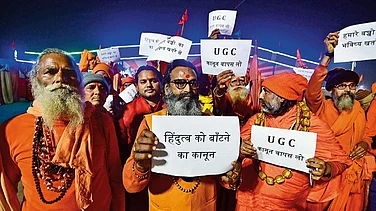The IT Ministry on Thursday sought a detailed response from WhatsApp on the issue of Israeli spyware that was allegedly used to target Indian journalists and human rights activists through its platform.
WhatsApp has been asked to submit its reply by November 4.
The ministry has written to WhatsApp seeking its response on the matter, a senior government official told PTI.
On Thursday, Facebook-owned WhatsApp said Indian journalists and human rights activists were among those globally spied upon by unnamed entities using an Israeli spyware Pegasus.
The Congress has accused the Modi government of snooping on activists and journalists and urged the Supreme Court to hold the Centre accountable over the issue.
"A government that spies on journalists/activists/Opposition leaders and treats its own citizens like criminals has lost the right to lead in our democracy. We urge the SC to take suo motu cognizance of these illegal activities and to hold this government to account," Congress leader Randeep Surjewala said.
WhatsApp said it was suing NSO Group, an Israeli surveillance firm, that is reportedly behind the technology that helped unnamed entities' spies to hack into phones of roughly 1,400 users.
These users span across four continents and included diplomats, political dissidents, journalists and senior government officials.
However, it did not say on whose behest the phones of journalists and activists across the world were targeted.
The spyware requires a target to click on an "exploit link" which lets the operator penetrate the victim's security features on the phone and install Pegasus without the user knowing. Once spyware is installed, the operator can access the user's private data including passwords, contact lists and text messages. It can also access the live voice calls of the user.
The scary part: the operator can even turn on the phone’s camera and microphone to capture activity in the phone’s vicinity.
WhatsApp did not say on whose behest the phones of journalists and activists across the world were targeted.
"In the latest vulnerability, the subject of the lawsuit, clicking the ‘exploit link’ may also not be required and a missed video call on WhatsApp will have enabled opening up the phone, without a response from the target at all," the report said.
WhatsApp alleged that the NSO Group and Q Cyber Technologies violated the US and California laws as well as WhatsApp’s terms of service which prohibit such surveillance.
On its part, the NSO Group, in a statement, refuted the allegations and said: “In the strongest possible terms, we dispute today’s allegations and will vigorously fight them. Our technology is not designed or licensed for use against human rights activists and journalists.”
Interestingly, the NSO Group said spyware Pegasus has been sold only to government agencies. “We license our product only to vetted and legitimate government agencies.”
In September 2018, Canada-based cybersecurity group Citizen Lab said: “We found suspected NSO Pegasus infections associated with 33 of the 36 Pegasus operators we identified in 45 countries” including India.
While the messages on WhatsApp are encrypted and secure, sources in WhatsApp said a device is corrupted by a malware, it makes the device vulnerable to breach of privacy, "often endangering freedoms and sometimes lives".
(With PTI inputs)


























